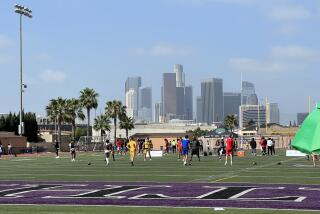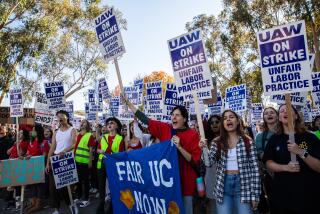5-Year Suspension at SDSU : National Won’t Pull Fraternity Charter
The national Pi Kappa Alpha fraternity has decided not to disband the San Diego State University chapter found guilty of sex and alcohol violations, a move that will allow the local fraternity to continue operating throughout its five-year banishment from campus.
Pi Kappa Alpha’s seven-member governing board voted unanimously in a telephone conference Wednesday afternoon not to revoke the chapter’s charter for violations stemming from a Nov. 14 party at which an 18-year-old sorority pledge claimed she was raped, said Ray Orians, executive vice president for the national organization, which is based in Memphis.
Calling the SDSU hearing panel a “kangaroo court” that did not give the fraternity due process, Orians said that the national organization can find “no evidence of a crime being committed by the chapter as an organization.”
Orians said the decision was also made because the national does not want to lose the income generated by chapter members’ dues and alumni donations. Fraternity members pay the national $125 in dues over four years, he said.
SDSU President Thomas Day said Thursday that he was “shocked” that the national organization is ignoring the university’s request to revoke Pi Kappa Alpha’s charter and apparently choosing to condone fraternity members’ behavior.
“If that is true on the part of responsible people in the national, it places them, I would think, in a very distasteful position of appearing to condone what we find to be very distasteful behavior,” Day said.
“I certainly hope they would reconsider and change their minds, but it gives the nation a very bad image of Pikes.”
Orians said that Pi Kappa Alpha will consider revoking the charter if Day reduces the penalty imposed on the SDSU chapter.
The local chapter on Wednesday lost its appeal of the university’s decision to expel it from campus for at least five years for violations including “physical abuse; lewd, indecent and obscene behavior, and obstructing the university’s disciplinary process.” The university is also charging 30 fraternity members with violations in connection with the incident.
The charges stemmed from a party between the fraternity and Delta Gamma sorority at which a freshman said she unknowingly drank punch spiked with alcohol and was sexually assaulted by three men while others watched, campus police said. The fraternity said the woman, who has since withdrawn from school, willingly drank alcohol, smoked marijuana and had sex.
The San Diego County district attorney’s office in December refused to file criminal charges, saying prosecutors could not prove that a rape had occurred.
Under SDSU’s penalty, Pi Kappa Alpha loses all connections with the university. It cannot use university athletic fields or meeting rooms, participate in recruitment or “rush” activities with the 16 other fraternities, or distribute information through the Interfraternity Council.
“It’s difficult to conceive that without on-campus status the organization could continue to remain viable and attract significant numbers of members,” said Michael Hoctor, director of housing and residential life for SDSU.
“They might continue to survive,” he said. “My sense is that it would be difficult for them to thrive.”
But Pi Kappa Alpha was able to attract 12 new pledges during its January rush, held several weeks after those of other campus fraternities. The fraternity also signed up a new group of “little sisters”--women students who affiliate with the fraternity--despite the controversy.
Ken Smerz, director of chapter affairs, conceded that affiliation with the university is the “lifeblood” of SDSU fraternities, and said it is too early to tell how badly the sanctions will hurt the fraternity. But the national organization’s decision will help the house, he said.
“We have a lot of work to do in the house and their decision is a supportive measure that will help us to continue,” Smerz said.
More to Read
Sign up for Essential California
The most important California stories and recommendations in your inbox every morning.
You may occasionally receive promotional content from the Los Angeles Times.










